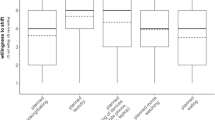Abstract
This paper focuses on the acceptance and motivations towards load shifting programs in the household sector. The research is based on a questionnaire addressing the Portuguese population and aiming to better understand the willingness to engage in load shifting, the main motivations for this, and the acceptance of automatic control systems to improve responsiveness to prices changes. The willingness to load shift electricity was then assumed as a proxy for the availability of the respondents to engage in a demand response (DR) program. The results show that most respondents would consider the engagement in DR and that the economic benefits are still the main driver. However, environmental concerns and even contribution towards reducing importations for the country emerge also as important motivations in particular for younger respondents. The study concludes also on the need to improve communication on DR programs and overcome the consumers’ inertia that still exists and prevent more effective participation in the electricity market.
Access this chapter
Tax calculation will be finalised at checkout
Purchases are for personal use only
Similar content being viewed by others
References
Parag, Y., Sovacool, B.K.: Electricity market design for the prosumer era. Nat. Energy 1(4), 16032 (2016). https://doi.org/10.1038/nenergy.2016.32
Weck, M.H.J., Van Hooff, J., Van Sark, W.G.J.H.M.: Review of barriers to the introduction of residential demand response: a case study in the Netherlands, pp. 790–816 (2017). https://doi.org/10.1002/er.3683
Goulden, M., Bedwell, B., Rennick-Egglestone, S., Rodden, T., Spence, A.: Smart grids, smart users? The role of the user in demand side management. Energy Res. Soc. Sci. 2, 21–29 (2014). https://doi.org/10.1016/j.erss.2014.04.008
Tveten, I., Bolkesjø, A.S., Ilieva, T.F.: Increased demand-side flexibility: market effects and impacts on variable renewable energy integration. Int. J. Sustain. Energy Plan. Manag. 11, 33–50 (2016). https://doi.org/10.5278/ijsepm.2016.11.4
Cruz, M.R.M., Fitiwi, D.Z., Santos, S.F., Catalão, J.P.S.: A comprehensive survey of flexibility options for supporting the low-carbon energy future. Renew. Sustain. Energy Rev. 97, 338–353 (2018). https://doi.org/10.1016/j.rser.2018.08.028
Paiho, S., et al.: Increasing flexibility of Finnish energy systems — A review of potential technologies and means. Sustain. Cities Soc. 43, 509–523 (2018). https://doi.org/10.1016/j.scs.2018.09.015
Gay, D., Rogers, T., Shirley, R.: Small island developing states and their suitability for electric vehicles and vehicle-to-grid services. Util. Policy 55, 69–78 (2018). https://doi.org/10.1016/j.jup.2018.09.006
Federal Energy Regulatory Commission: Federal Energy Regulatory Commission Survey on Demand Response, Time-Based Rate Programs/Tariffs and Advanced Metering Infrastructure Glossary, FERC-727 a (2008)
U.S. Department of Energy: Benefits of Demand Response in Electricity Markets and Recommendations for Achieving Them. A report to the United States Congress Pursuant to Section 1252 of the Energy Policy Act of 2005, February, pp. 1–122 (2006)
Dranka, G.G., Ferreira, P.: Review and assessment of the different categories of demand response potentials. Energy 179, 280–294 (2019). https://doi.org/10.1016/j.energy.2019.05.009
Alparslan, M., Batman, A., Bagriyanik, M.: Review and comparison of demand response options for more effective use of renewable energy at consumer level. Renew. Sustain. Energy Rev. 56, 631–642 (2016). https://doi.org/10.1016/j.rser.2015.11.082
Instituto Nacional de Estatística: Resultados preliminares do Inquérito ao Consumo de Energia no Sector Doméstico 2020 (2021)
Silva, S., Soares, I., Pinho, C.: Electricity residential demand elasticities: urban versus rural areas in Portugal. Energy 144, 627–632 (2018). https://doi.org/10.1016/j.energy.2017.12.070
Apolinario, I., Felizardo, N., Garcia, A.L., Oliveira, P., Trinidad, A., Verdelho, P.: Determination of time-of-day schedules in the Portuguese electric sector. In: 2006 IEEE Power Engineering Society General Meeting, p. 8 (2006). https://doi.org/10.1109/PES.2006.1709487
Entidade Reguladora dos Serviços Energéticos (ERSE): Reformulação do Regulamento Tarifário do setor elétrico (2021)
Ferreira, P., Rocha, A., Araujo, M.: Awareness and attitudes towards demand response programs – a pilot study. In: 2018 International Conference on Smart Energy Systems and Technologies (SEST), pp. 1–6, September 2018. https://doi.org/10.1109/SEST.2018.8495804
Dalgleish, T., et al.: Handbook of biolological statistics. J. Exp. Psychol. Gen. 136(1), 23–42 (2007)
Weber, S., Puddu, S., Pacheco, D.: Move it! How an electric contest motivates households to shift their load profile. Energy Econ. 68, 255–270 (2017). https://doi.org/10.1016/j.eneco.2017.10.010
Arning, K., Ziefle, M.: Understanding age differences in PDA acceptance and performance. Comput. Human Behav. 23(6), 2904–2927 (2007). https://doi.org/10.1016/j.chb.2006.06.005
Srivastava, A., Van Passel, S., Laes, E.: Assessing the success of electricity demand response programs: a meta-analysis. Energy Res. Soc. Sci. 40, 110–117 (2018). https://doi.org/10.1016/j.erss.2017.12.005
Boogen, N., Datta, S., Filippini, M.: Demand-side management by electric utilities in Switzerland: analyzing its impact on residential electricity demand. Energy Econ. 64, 402–414 (2017). https://doi.org/10.1016/j.eneco.2017.04.006
Conchado, A., Linares, P., Lago, O., Santamaría, A.: An estimation of the economic and environmental benefits of a demand-response electricity program for Spain. Sustain. Prod. Consum. 8, 108–119 (2016). https://doi.org/10.1016/j.spc.2016.09.004
European Commission: Special Eurobarometer 468 Report Attitudes of European citizens towards the environment Fieldwork September-October 2017 November 2017 Survey requested by the European Commission, Special Eurobarometer 468 Report Attitudes of European citizens towards th (2017)
Majdalani, N., Aelenei, D., Lopes, R.A., Silva, C.A.S.: The potential of energy flexibility of space heating and cooling in Portugal. Util. Policy 66, 101086 (2020). https://doi.org/10.1016/j.jup.2020.101086
Foulds, C., Christensen, T.H.: Funding pathways to a low-carbon transition. Nat. Energy 1(7), 16087 (2016). https://doi.org/10.1038/nenergy.2016.87
Author information
Authors and Affiliations
Corresponding author
Editor information
Editors and Affiliations
Rights and permissions
Copyright information
© 2022 ICST Institute for Computer Sciences, Social Informatics and Telecommunications Engineering
About this paper
Cite this paper
Ferreira, P., Rocha, A., Araújo, M. (2022). Assessing Household Electricity Consumers’ Willingness to Load Shift. In: Afonso, J.L., Monteiro, V., Pinto, J.G. (eds) Sustainable Energy for Smart Cities. SESC 2021. Lecture Notes of the Institute for Computer Sciences, Social Informatics and Telecommunications Engineering, vol 425. Springer, Cham. https://doi.org/10.1007/978-3-030-97027-7_6
Download citation
DOI: https://doi.org/10.1007/978-3-030-97027-7_6
Published:
Publisher Name: Springer, Cham
Print ISBN: 978-3-030-97026-0
Online ISBN: 978-3-030-97027-7
eBook Packages: Computer ScienceComputer Science (R0)




